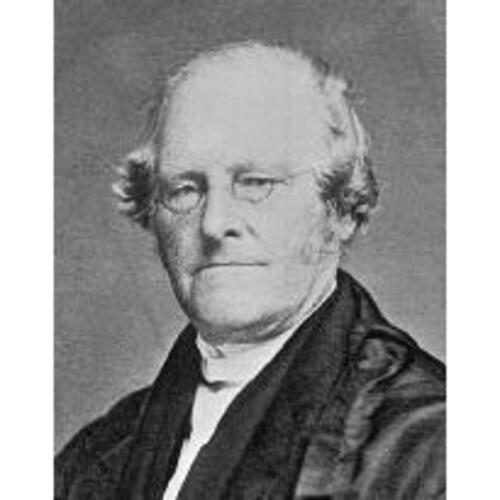
Source: Courtesy of Wikimedia Commons
HINCKS, WILLIAM, Unitarian clergyman, theologian, and university professor; b. 16 April 1794, Cork, Ireland, second son of the Reverend Thomas Dix Hincks and Anne Boult; d. 10 Sept. 1871, Toronto, Ont.
William Hincks was born into a distinguished family. He was educated for the Presbyterian ministry, and served at Cork in 1814 and at Exeter, England, from 1816 until 1822 when he joined the Unitarian Church and became minister of Renshaw Street Unitarian Church, Liverpool.
His interests having shifted to science, he began a teaching career in 1827 and was tutor in mathematics and philosophy at Manchester College, York, until 1834. There he also became associated with the political school known as Philosophical Radicals and argued for the extension of popular rights. In 1839, in London, he resumed his ministerial work, and served as well from 1842 to 1847 as the first editor of the Inquirer, a Unitarian weekly journal. In it Hincks showed a special interest in education, peace, and temperance, and favoured the abolition of slavery and of the death penalty, the shortening of hours of labour, and the rational use of leisure. He obtained in 1849 the appointment of professor of natural history at Queen’s College, Cork. Four years later at nearly 60 years of age Hincks came to Canada as the first professor of natural history at University College, Toronto.
Hincks’ appointment has attracted more than passing attention because he was chosen in preference to the young, but later famous, Thomas Henry Huxley. The preliminary selection committee did not fix upon one person but placed Hincks, Huxley, and one Dr Ayres on an equal footing. Huxley had already an impressive list of zoological publications to his credit and had the support of 16 prominent British and French biologists including Charles Darwin. Success, however, fell to Hincks, probably “through the influence of his brother,” Francis Hincks*, at that time premier of the Province of Canada, a “qualification,” Huxley remarked, “better than all the testimonials in the world.” Such political interference with university appointments was a long-standing problem.
In Toronto William Hincks served as president of the Canadian Institute (now the Royal Canadian Institute) from 1869 to 1871. For several years he was editor of its Canadian Journal and contributed 24 articles on subjects ranging from botany and zoology to economics and psychology. He also published in British journals and was a fellow of the Linnean Society in Great Britain. He was a prominent member of Toronto’s Unitarian congregation and occasionally conducted its services.
Hincks was a gentleman beloved by his students, who nevertheless spoke of his ideas as “antiquated” and of his methods of teaching as out of date and “leaving much to be desired.” “We learned to know his ways,” asserted one student, “and to make our papers suit his peculiar taste.” Another, James Loudon*, later president of the University of Toronto, commented that in Hincks’ department “success . . . depended largely on memorizing.”
Hincks married in 1817 Maria Ann Yandell by whom he had eight children; she died in 1849. The maiden name of his second wife, Sarah Maria, whom he married before leaving England, is not known.
PAC, RG 5, C1, 375, 386. York County Surrogate Court (Toronto), will of William Hincks. “The late Professor Hincks,” Canadian Journal, new ser., XIII (1871–73), 253–54. Inquirer (London), 30 Sept. 1871. J. of Education for Ont., XXIV (1871), 155. DNB (entry for Thomas Dix Hincks). E. H. Craigie, A history of the department of zoology of the University of Toronto up to 1962 ([Toronto, 1966]). John King, McCaul: Croft: Forneri, personalities of early university days (Toronto, 1914). R. S. Longley, Sir Francis Hincks; a study of Canadian politics, railways, and finance in the nineteenth century (Toronto, 1943). Herbert McLachlan, The Unitarian movement in the religious life of England; its contribution to thought and learning, 1700–1900 (London, 1934). The Royal Canadian Institute, centennial volume, 1849–1949, ed. W. S. Wallace (Toronto, 1949), 197. W. S. Wallace, A history of the University of Toronto, 1827–1927 (Toronto, 1927). C. R. W. Biggar, “The Reverend William Hincks, M.A.,” University of Toronto Monthly, II (1901–2), 232–33.
Cite This Article
J. Donald Wilson, “HINCKS, WILLIAM,” in Dictionary of Canadian Biography, vol. 10, University of Toronto/Université Laval, 2003–, accessed December 28, 2025, https://www.biographi.ca/en/bio/hincks_william_10E.html.
The citation above shows the format for footnotes and endnotes according to the Chicago manual of style (16th edition). Information to be used in other citation formats:
| Permalink: | https://www.biographi.ca/en/bio/hincks_william_10E.html |
| Author of Article: | J. Donald Wilson |
| Title of Article: | HINCKS, WILLIAM |
| Publication Name: | Dictionary of Canadian Biography, vol. 10 |
| Publisher: | University of Toronto/Université Laval |
| Year of publication: | 1972 |
| Year of revision: | 1972 |
| Access Date: | December 28, 2025 |



